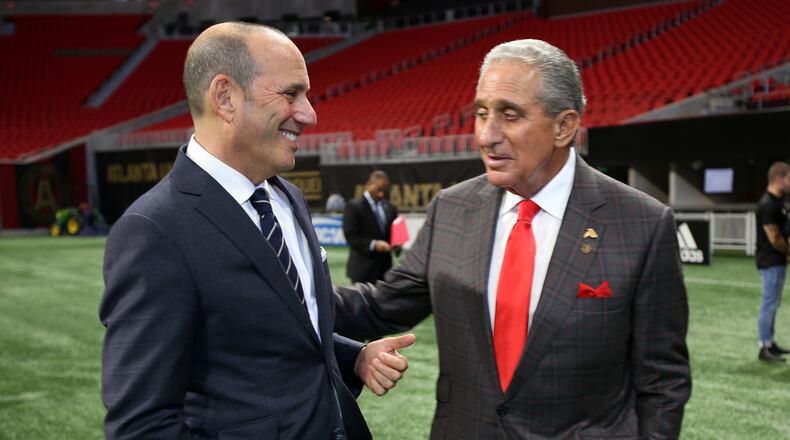MLS Commissioner Don Garber praised Atlanta and Atlanta United, discussed expanding beyond 28 teams, next year’s All-Star game and playoff formats and said that the league needs to start being able to sell its younger, valuable players in a State of the League address Friday ahead of Saturday’s MLS Cup between Atlanta United and Portland at Mercedes-Benz Stadium.
Speaking at the Westin, Garber said that what is happening in Atlanta continues to astound him. The team broke its over average attendance mark and there are more than 73,000 tickets expected to be sold and distributed for Saturday’s championship. The league expects that it will be the most attended soccer game in the world during the week. He said more than 800 media members were credentialed for the game, the most in league history.
“The club is one of great stories in history of our league,” Garber said. “It is embraced by people from all walks of life. Games are the place to be.”
Garber shared that while at a conference a year ago, he bumped into former U.S. Attorney General Sally Yates, who shared that she’s a season-ticket holder and fan of the team.
“Their success shows that there really is no limit to what MLS can be,” Garber said.
The team’s success in sharing a home with the Falcons in a stadium that has a capacity for football of around 80,000, as well as that of Seattle, which shares a home with the NFL’s Seahawks, is contributing to Garber reconsidering guidelines for future expansion clubs. He said the league still prefers soccer-specific stadiums, but won’t rule out future teams using larger venues. He said a key factor that drives success is the way Atlanta United owner Arthur Blank and the organization has embraced this team with equal branding between Atlanta United and the Falcons.
“If (expansion stadiums are) managed in ways that we are sharing a building instead of being a tenant in a building, that’s something we will consider going forward,” he said.
Asked more about expansion, Garber said that the league’s 28th team will be decided within the next 12 months. The next four coming online are Cincinnati, Nashville, Miami and Austin. There are at least six cities/ownership groups interested in expansion. Garber also said that the league will consider expanding beyond 28 teams, though there won’t be any more in Canada.
Switching to scheduling, Garber said that the league is looking at the playoff format, and he predicts that it will change for next season, pending approval by the ownership group, which will meet next week. He said the next format would reward results for the regular season. The Athletic predicted a possible change would switch the conference semifinals and finals from a two-legged, home-and-home series, to a one-game series hosted by the higher seed.
“My guess is we are going to end up with something different than we have now,” he said.
What likely won’t change, at least for next year, is the format for the All-Star Game, which for the past few years has featured a team of MLS All-Stars taking on an established club team from Europe or Mexico. Next year’s game will be in Orlando. Garber did say that MLS has had discussions with LIGA MX about the two league’s All-Stars facing each other.
What also doesn’t seem likely to change is the number of Designated Players used by the league. A Designed Player is a player whose salary is significantly higher than the other players. The number of DPs per team is capped at three. It was reported earlier this year that the league was considering reducing the number of DPs to two. Garber implied no change was coming.
“I think we have a pretty good formula now,” Garber said.
What must change is the league’s ability to sell its younger players, he said. Several MLS teams have seen players in their academies, who haven’t signed MLS contracts, signed by clubs in Europe with no recompense. Zyen Jones, formerly an Atlanta United academy player, is an example. He was signed by Schalke in Germany.
“Don’t know if it’s young players chasing their dreams as much as it is international clubs chasing our young players,” Garber said. “Products we are developing are some of our most important assets.”
“We need to figure out way to protect or receive compensation if we can’t sign them.”
About the Author
Keep Reading
The Latest
Featured


